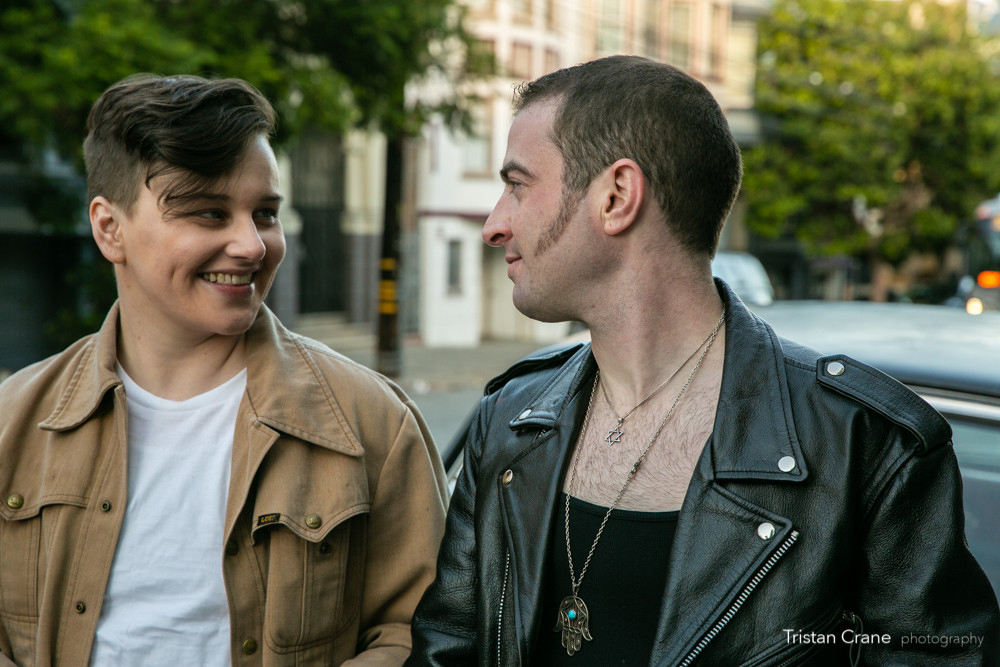Queer mythmaking is one of Shawna Virago’s preoccupations.
A folk-punk singer-songwriter, San Francisco legend, and the artistic director of the San Francisco Transgender Film Festival, she has endeavored not only to tell stories about trans experiences, but to situate them in their proper historical context. And by her own admission, this is a challenging task—because there hasn’t always been a way to have the right discussions around what the history of transgender people or transgender culture really is.
“It’s weird, because the history isn’t accurate,” she says. “But what history is?”
In the context of this year’s festival—which, instead of screening at the Roxie like usual, runs in your house and my house and everyone else’s house, too, Nov. 12-15—Virago is referring to the legacy of Lou Sullivan, a San Francisco diarist and activist for the recognition of trans men who died in 1991 at the age of 39. Instrumental in the work of separating gender identity from sexual orientation as we have come to understand those terms today, Sullivan may have been the first person in America to publicly identify as a gay trans man.
He’s also the subject of the centerpiece of Program 2, Mya Byrne’s 10-minute short titled “Lou: A San Francisco Fantasy.” Shot in a stylized Castro that looks as cruisy as Manhattan’s piers, it’s a chance to give an unfairly obscure figure a chance at a little posthumous swagger. Lou Sullivan was a cool guy, and people are doing their doctoral work on him, so why not let him be larger-than-life on screen for a few minutes?
Or, as Virago says, “He missed out. The community just got a little bit bigger [after his death] and there was more going on, and he would have been appreciated and it wouldn’t have been quite the struggle it was.”
While every last thing that hasn’t been canceled outright this year has taken a turn for the digital, that’s actually not a terrible challenge for this plucky film festival. After 23 years, the overall vision and the curation have remained largely the same, Virago says. It’s still pay-what-you-can, for instance, and since attention spans are shortest on the couch, nearly all the half-dozen films that comprise each of the seven Programs is under 20 minutes in length.
One thing the festival has recommitted to is access for deaf and hard-of-hearing audiences. So, for the first time, all seven programs are closed-captioned, which flows out of a foundational commitment to always find new demonstrations of solidarity.
Help us save local journalism!
Every tax-deductible donation helps us grow to cover the issues that mean the most to our community. Become a 48 Hills Hero and support the only daily progressive news source in the Bay Area.
“I think we’re really committed to anti-oppression approaches to art and politics and community, so that is always how we’ve operated. It’s nothing new,” Virago says. “I always think of this as a punk label, we’re like SFT Records or maybe Anti Records. We do want to prioritize marginalized voices, and I find that that’s where so much of the great art is made. It goes hand-in-hand — and always has.”
Her belief that long-neglected artists have often been producing some of the best art is a guiding principle. Only a few months after Disclosure, Sam Feder’s documentary about trans representation in Hollywood—a trans Celluloid Closet, if you will—made the move from Sundance to Netflix, that belief is still intact.
Gabrielle Le Roux and Nthabiseng Mokoena’s “Reclaiming Intersex (while Black, genderqueer and feminist in South Africa)” will almost certainly be another festival highlight. It’s certainly among the most widely screened films, but not because it would have had a commercial release even if 2020 had been a typical year. Speaking right into the camera, Nthabiseng delivers their own account of their life, from their mother’s desperation to find adequate care for them as a newborn to their teenage phase as a case study for South Africa’s medical establishment to thrill to.
“Film festivals committed to a kind of social justice work are where films like this have to live and where their audiences will be found,” Virago says.
Our conversation took place before last week’s election, but Virago is keenly aware of the contradictory impulses in American society surrounding queer visibility and trans rights. The country rightly celebrates newly elected trans legislators even as we’re still firmly under the cultural sway of belligerent, retrograde people and institutions. One sign of confidence among trans filmmakers stands out, though: the embrace of horror.
Best exemplified by The Silence of the Lambs, transgressions of gender norms have typically been associated less with bravery and rebellion than with homicidal psychopathy. (Throw in some gory titillation at non-standard anatomies and you’ve got yourself a deal, Mr. Demme!)
Nonetheless, almost every film in the festivals’ seventh and final Program is a thriller or a horror in some way, crowned by “Love You Forever,” which the festival describes as a “time loop of ritualistic trauma” that takes place “within the spectral plain of ‘Trans Girl Ether.’ ” The screening committee definitely had a discussion about that one.
“It does have your standard horror-film violence and blood and gore, and if you don’t like horror films it can seem so shocking,” Virago says. “But if you’re a fan of horror, it’s nothing new. What is new is that it’s directed by trans women of color, and they are telling a story. They bring that lens and that consciousness to it.”
The San Francisco Transgender Film Festival runs online Nov. 12-15, more info here.

